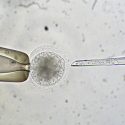Researchers look to natural sources for organic meat preservatives
When Jeff Sindelar talks about the ingredients he’s working with, you’d think he was making juice. Not quite. He’s adding things like cranberry concentrate, cherry powder, lemon extract and celery powder to meat.

Jeff Sindelar
He’s not adding them for flavor. He’s looking at ways to ensure that meat products labeled “organic” and “natural”-which he says now account for at least a third of the processed meat products sold at retail-are safe to eat.
“A number of different natural-based organic acids offer a significant improvement to food safety,” says Sindelar, associate professor and extension meat specialist at the University of Wisconsin–Madison. “We have tested a number of different ingredients, such as cranberry concentrate, grape seed oil and tea tree extract.”
Providing a safe organic meat product is no simple task, he says. One of the main reasons consumers choose organic foods is to limit their intake of manufactured ingredients. That takes a lot of common meat-curing methods off the table.
“Most ingredients and technologies that serve as antimicrobials-ingredients that can improve the safety by either suppressing, inhibiting, or destroying any pathogenic bacteria-are not able to be used in products labeled ‘natural’ and ‘organic,'” Sindelar says.
Fortunately, there are some compounds from natural sources that work as well as standard preservatives such as sodium nitrate and nitrite or sodium erythorbate. The problem is that it can take heavy doses of some natural ingredients to provide equivalent results.
“Cranberry concentrate is a very effective natural anti-microbial,” says Sindelar. “But if you use enough to control the growth of bacteria, the meat turns cranberry red.” The challenge is to ensure that organic meats are both safe and appetizing.
Sindelar and other UW researchers are testing a wide variety of microbe-inhibiting natural extracts. Part of this involves ‘challenge testing’- adding infectious microbes to the meat to make sure that a given ingredient prevents the growth of bacteria throughout processing and storage. If substantial numbers of microbes grow, that ingredient is ruled out.
In some cases, they’re turning to nature for the same preservatives that are usually synthesized. Naturally occurring nitrates in vegetable extracts can be converted to meat-preserving nitrites by adding certain types of bacteria. The nitrites can prevent the growth of disease-causing bacteria, keep fats from turning rancid and yield the flavor and pinkish color that we have come to expect from cured meats.
Successful tests have already led to new products. Cherry powder combined with celery powder “is already being adopted by processors that make organic and natural meats because of how effective these ingredients are in improving meat safety and quality,” notes Sindelar. And the search for other natural additives continues.
“There’s no question that there will be new ingredients identified that have potential antimicrobial efficacy and meet the standards for organic labeling. The fundamental research that we’ve accomplished is critical for the future of food safety in this area. It will facilitate the use of these ingredients and the development of safer organic meat products.
–Cathy Day

